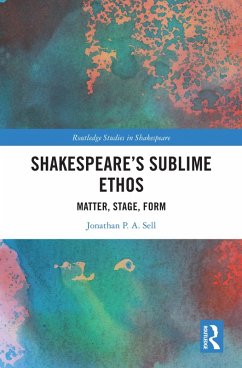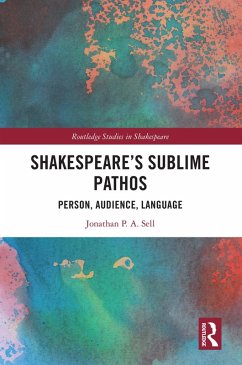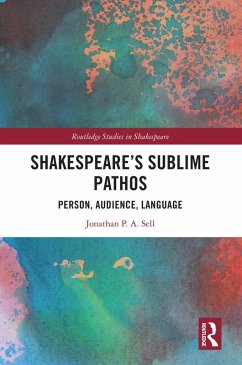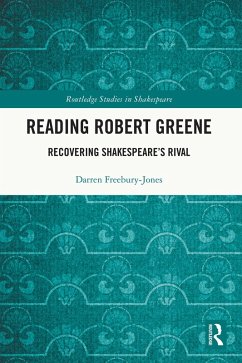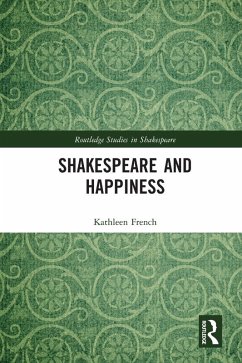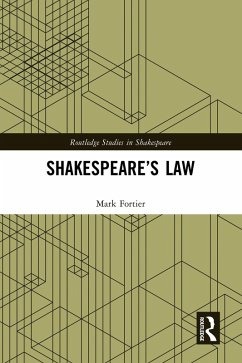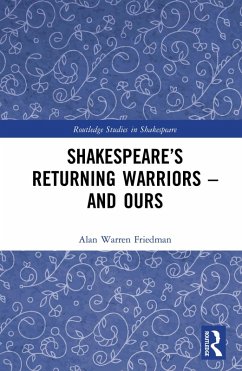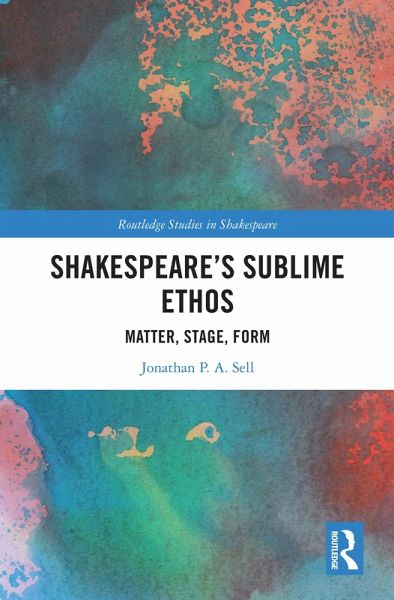
Shakespeare's Sublime Ethos (eBook, ePUB)
Matter, Stage, Form
Versandkostenfrei!
Sofort per Download lieferbar
39,95 €
inkl. MwSt.
Weitere Ausgaben:

PAYBACK Punkte
20 °P sammeln!
Winner of the AEDEAN "Enrique García Díez" Literature Research Award 2023Winner of the European Society for the Study of English Book Award 2024Shakespeare's Sublime Ethos: Matter, Stage, Form breaks new ground in providing a sustained, demystifying treatment of its subject and looking for answers to basic questions regarding the creation, experience, aesthetics and philosophy of Shakespearean sublimity. More specifically, it explores how Shakespeare generates a sublime mood or ethos which predisposes audiences intellectually and emotionally for the full experience of sublime pathos, explore...
Winner of the AEDEAN "Enrique García Díez" Literature Research Award 2023
Winner of the European Society for the Study of English Book Award 2024
Shakespeare's Sublime Ethos: Matter, Stage, Form breaks new ground in providing a sustained, demystifying treatment of its subject and looking for answers to basic questions regarding the creation, experience, aesthetics and philosophy of Shakespearean sublimity. More specifically, it explores how Shakespeare generates a sublime mood or ethos which predisposes audiences intellectually and emotionally for the full experience of sublime pathos, explored in the companion volume, Shakespeare's Sublime Pathos. To do so, it examines Shakespeare's invention of sublime matter, his exploitation of the special characteristics of the Elizabethan stage, and his dramaturgical and formal simulacra of absolute space and time. In the process, it considers Shakespeare's conception of the universe and man's place in it and uncovers the epistemological and existential implications of key aspects of his art. As the argument unfolds, a case is made for a transhistorically baroque Shakespeare whose "bastard art" enables the dramatic restoration of an original innocence where ignorance really is bliss. Taken together, Shakespeare's Sublime Ethos and Shakespeare's Sublime Pathos show how Shakespearean drama integrates matter and spirit on hierarchical planes of cognition and argue that, ultimately, his is an immanent sublimity of the here-and-now enfolding a transcendence which may be imagined, simulated or evoked, but never achieved.
Winner of the European Society for the Study of English Book Award 2024
Shakespeare's Sublime Ethos: Matter, Stage, Form breaks new ground in providing a sustained, demystifying treatment of its subject and looking for answers to basic questions regarding the creation, experience, aesthetics and philosophy of Shakespearean sublimity. More specifically, it explores how Shakespeare generates a sublime mood or ethos which predisposes audiences intellectually and emotionally for the full experience of sublime pathos, explored in the companion volume, Shakespeare's Sublime Pathos. To do so, it examines Shakespeare's invention of sublime matter, his exploitation of the special characteristics of the Elizabethan stage, and his dramaturgical and formal simulacra of absolute space and time. In the process, it considers Shakespeare's conception of the universe and man's place in it and uncovers the epistemological and existential implications of key aspects of his art. As the argument unfolds, a case is made for a transhistorically baroque Shakespeare whose "bastard art" enables the dramatic restoration of an original innocence where ignorance really is bliss. Taken together, Shakespeare's Sublime Ethos and Shakespeare's Sublime Pathos show how Shakespearean drama integrates matter and spirit on hierarchical planes of cognition and argue that, ultimately, his is an immanent sublimity of the here-and-now enfolding a transcendence which may be imagined, simulated or evoked, but never achieved.
Dieser Download kann aus rechtlichen Gründen nur mit Rechnungsadresse in A, B, BG, CY, CZ, D, DK, EW, E, FIN, F, GR, HR, H, IRL, I, LT, L, LR, M, NL, PL, P, R, S, SLO, SK ausgeliefert werden.




